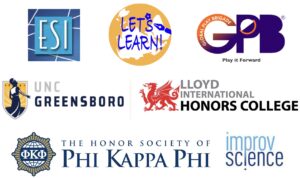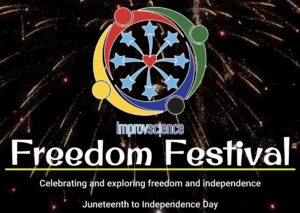
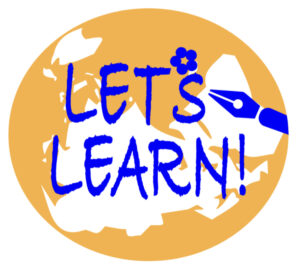
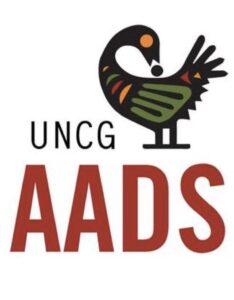
The Freedom Festival is a celebration and an exploration of the relationship between freedom and independence. It lasts from Juneteenth (June 19, marking the end of slavery in the U.S.) through Independence Day (July 4, marking the independence of the U.S. from the British Empire). It consists of live, virtual and hybrid events from all over the U.S. and beyond. This year, Let’s Learn!, in partnership African American & African Diaspora Studies at UNC Greensboro, is contributing three online classes/conversations to the Freedom Festival.
All Let’s Learn! students are invited to attend. To check out other Freedom Festival offers, click here.
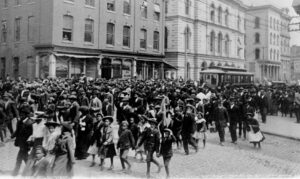
Dan Friedman, Ph.D.
Friday, June 21, 8:00 pm -9:30 pm, Eastern U.S. Time
Our communities and families are repositories of history. This history is not usually written up in textbooks. Often, we don’t even share it with each other. Now that the teaching of Black History is under attack, it is more important than ever that our untold histories are heard. This story-telling gathering is an invitation to share how your communities have celebrated Juneteenth over the years and to introduce each other to the histories our parents or grandparents made in the Civil Rights Movement, the Labor Movement, the Peace Movement, the Women’s and Gay Liberation Movements, the Black Lives Matter movement and beyond.
Join Dr. Dan Friedman, historian, playwright, and life-long community organizer in this gathering to speak-out loud and proud our communities’ and families’ political histories. Come prepared to share your story, a photo (if you have one), and, if they’re down for it, bring you family along!
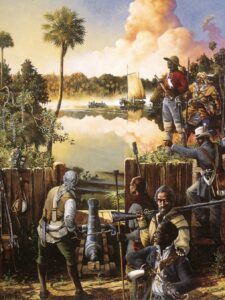
Brian Mullin
Sunday, June 23, 1:00 pm – 2:30 pm; 6:00 pm – 7:30 pm London time; 10:00 am -11:30 am, Pacific U.S. Time
Did you know that a prosperous, self-governing community of free Black people existed on American soil before the Civil War? This fascinating but little-known chapter in African-American history took place in the mostly unregulated swamplands of Spanish Florida, before the territory became part of the United States. At the end of the War of 1812, a regiment of Black soldiers who’d fought for Britain became instilled with abolitionist ideas and were left in command of a military fort at Prospect Bluffs, FL. Over its years of existence, the Fort grew to encompass houses and farmland and was a hub of trade with the local Seminole tribes. It also became a magnet for enslaved people across the border to flee plantations in Georgia, Mississippi, and Alabama — which led to the so-called ‘Negro Fort’ becoming a target for US military forces. The Fort’s destruction, however, was just one part of this community’s incredible story: the surviving inhabitants embarked on an epic journey across decades, down the Florida peninsula and into the Caribbean, clinging to papers and promises of freedom from the British Crown.
Theatre-maker Brian Mullin first researched the Fort and its community on a Hearst Fellowship at the American Antiquarian Society in 2018. Based in the UK, Brian has just received seed funding from Kings College London, along with director Tian Brown-Sampson, to begin developing this transatlantic story into a theatre piece that also explores its resonance to later histories of Black Caribbeans and the British Empire.
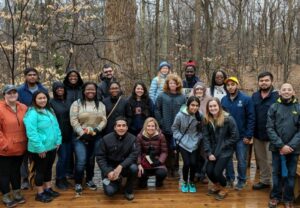 Freedom-Makers: Maroons and the Underground Railroad
Freedom-Makers: Maroons and the Underground RailroadSaturday, June 29, 4:00 – 5:30 pm, Eastern U.S. Time; 1:00 pm – 2:30 pm, Pacific U.S. Time
We will visit the “Underground Railroad Tree” in the Guilford Woods of North Carolina. The 300-year-old Tulip Poplar tree is a living monument and witness to the freedom-seekers who were part of this eastern seaboard launching point of the Underground Railroad during the early 19th century. The great tree is located in a 350-acre forest in Greensboro, N.C. We will walk through the woods, share the history of the area, read excerpts from primary source accounts (journals and runaway ads), look at material culture and discuss the oral history of runaway enslaved people (maroons), and explore the ways in which we–people and our living world–create community and connectivity underground, overground, everywhere.
Led by Dr. Omar Ali, author of In the Lion’s Mouth: Black Populism in the New South, 1886-1900, who serves as a dean and a professor of history and African American & African Diaspora studies (AADS) at the University of North Carolina Greensboro.
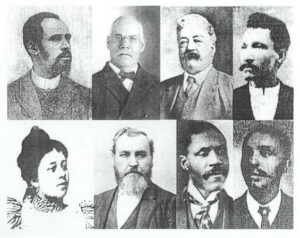 Black Populism in the New South: Post-Reconstruction Movement-Making
Black Populism in the New South: Post-Reconstruction Movement-Making Omar H. Ali, Ph.D.
Sunday, June 30, 4:00 – 5:30 pm, Eastern U.S. Time; 1:00 pm – 2:30 pm, Pacific U.S. Time
In the decade following the collapse of Reconstruction a new movement arose in the South comprising black farmers, sharecroppers, and agrarian workers—a Black Populist movement. Organized through the Colored Farmers Alliance, among other black-led labor groups, mutual aid associations, and black churches—and then expressed through the People’s Party, African Americans across the South created an independent political movement of their own which at times connected with an adjacent white Populist movement, and at other times diverged sharply from it. In this lecture we will explore this history.
Led by Dr. Omar Ali, author of In the Lion’s Mouth: Black Populism in the New South, 1886-1900, who serves as a dean and a professor of history and African American & African Diaspora studies (AADS) at the University of North Carolina Greensboro.

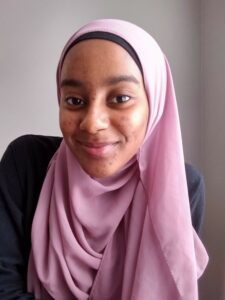 Muslim
MuslimMs. Zainab Adamou-Mohamed and Dr. Omar H. Ali
Tuesday, January 16, 7:30 pm Eastern U.S. Time
With the humanitarian crisis in Gaza and rising Islamophobia around the world, what do Muslims believe and practice? What histories and values do Muslims bring to the contemporary world? How are young Muslims, in particular, coping with the misunderstandings and discrimination they are now facing? This is a chance to ask questions of Muslims who face these particular challenges. Join Zainab Adamou-Mohamed, President ofthe Muslim Student Association at the University of North Carolina at Greensboro, and other young Muslims, along with the Dean of the Honors College, Dr. Omar Ali, for an open discussion centering on these and other questions you bring. All are welcome and encouraged to be part of this conversation.
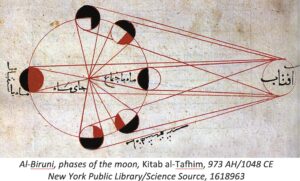 Islam in the Global History of Science
Islam in the Global History of Science Dr. Omar Ali and Dr. Nadja Cech
Tuesday, February 6, 2:00 pm, Eastern U.S. Time
Muslim scientists and scholars from Baghdad to Cordoba and beyond, lay the foundation for the development of modern astronomy, chemistry, and medicine. Join historian Dr. Omar Ali and chemist Dr. Nadja Cech as they explore the important scientific contributions of figures such as Ibn al-Haytham, Al-Khwarizmi, Jabir Ibn Hayyan, and Ibn Sina, among others. This session is part of a semester-long seminar, “Towards a Global History of Science” at the University of North Carolina Greensboro that locates modern science as part of a seamless history of people from societies across the globe since the ancient world.
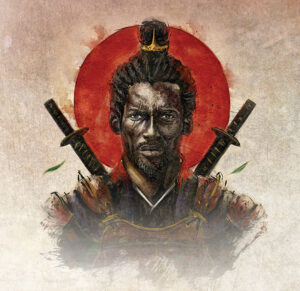 African Samurai:
African Samurai: Prof. Thomas Lockley
Tuesday, February 13, 7:00 pm, Eastern U.S. Time
Wednesday, February 14, 9:00 am, JAPAN
As part of Black History Month, learn about the remarkable life of history’s first foreign-born samurai and his journey from Mozambique to the heights of 16th century Japanese society. This class is taught by Prof. Thomas Lockley, co-author of the only English language biography of Yauke, and a professor at Nihon University in Tokyo, where he teaches courses on the international and multicultural history of Japan and the rest of East Asia. This is event is being co-sponsored by the Japanese Club and the Japanese Studies Program at UNC Greensboro.
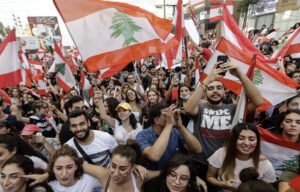 Introduction to Lebanon
Introduction to LebanonChristelle Barakat
Saturday, February 17, 11:00 am – 12:30 pm, Eastern U.S. Time;
6:00 p.m. – 7:30 p.m., Eastern European Time (Lebanon)
Lebanon has always been at the heart of various controversies, particularly during recent times. Located at the eastern edge of the Mediterranean Sea, this small sliver of land has been ruled by the Ottoman Empire, been under a French mandate, gained independence in 1943, and survived a vehement 1975-1990 civil war. Its people and culture embody a rich and diverse history marked by resilience and advocacy for change. Christelle Barakat, a researcher with the Lebanese Center for Policy Studies, will introduce this history, share the nation’s challenges in recent years, including the ongoing impacts of the 2019 economic crisis, the COVID-19 pandemic, and the Beirut port blast, and answer your questions about the politics, culture, and tenets of coexistence within this important nation at one of the crossroads of the world.
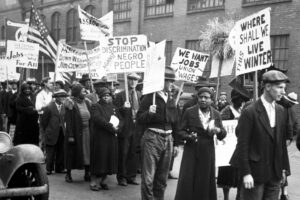
Unemployed March, Pine Street, during Great Depression. Photograph by Ralph A. Ross, 1931. Missouri History Museum Photographs and Prints Collections. N01583.
Dr. Dan Friedman
Saturday, February 24, 1:00 pm – 2:30 pm, Eastern U.S. Time
Our families are repositories of political history. Were your parents or grandparents active in the Civil Rights Movement, the Labor Movement, the Peace Movement, the struggle for independence of your country, the fights to overthrow a dictatorship? So much of the history that we “ordinary people” make has been forgotten or distorted. This is a chance to share some of that lost history with others from around the world. Dan Friedman, historian, and playwright will lead this speaking-aloud of our family’s political histories. Come prepared to share your story, a photo (if you have one), and, if they’re down for it, bring you family along!
 The Art and Science of Challah
The Art and Science of ChallahJoan Epstein and Dr. Nick Gross
Sunday, March 3, 12:00 pm – 1:30 pm, Eastern U.S. Time
Bread making is an ancient tradition and the baking of celebratory breads is common throughout many cultures. Each ingredient in the bread plays a specific role and it is crucial to prepare the dough in a particular way. In the Jewish tradition, challah (an egg bread that is pleated or woven) serves as a celebratory bread for the sabbath. Join our two instructors, Dr. Nick Gross, a research scientist at Boston University, and Joan Epstein, an educator based in Cambridge MA, as they demonstrate challah making and discuss the science behind the ingredients and the bread making process. The class will conclude with a demonstration of some of the shaping that is possible with challah along with a discussion of its role or meaning in the celebration of Passover.
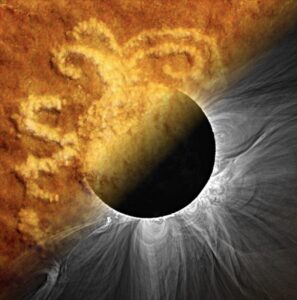 Scientific and Cultural Perspectives on the “Great American Eclipse”
Scientific and Cultural Perspectives on the “Great American Eclipse”Dr. Cherilynn Morrow and Dr. Nick Gross
Saturday, March 9, 2:00 pm – 3:30 pm, Eastern U.S. Time
11:00 am – 12:30 pm Pacific U.S. Time
On April 8th, 2024, everyone in the continental United States will experience a solar eclipse—the last one visible in the U.S. for the next 20 years!
Throughout human history and across human cultures, eclipses have been experienced as dramatic events that have been recorded in a variety of ways. Chaco Canyon, a UN World Heritage Site in what is now northwestern New Mexico, was a major cultural center of the Ancestral Puebloan people. It contains the Rock of the Sun, an image carved into a rock face, that may be interpreted as the Chaco residents’ impression of the 1097 total solar eclipse. The NASA PUNCH Outreach program studies and educates on the similarities and differences between modern and ancient Sun-watching. Join Dr. Cherilynn Morrow, who is leading the NASA PUNCH Mission Outreach effort, and Dr. Nicholas Gross of Boston University, as they lead a class exploring the science of an eclipse as well as the historical and cultural significance of the Rock of the Sun and other solar observations.
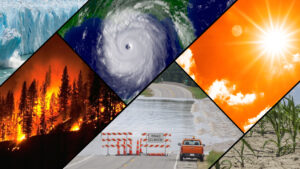 How to Organize a Climate Change Project
How to Organize a Climate Change ProjectFarzana Gandhi and Dr. Jim Martinez
Saturday, March 16, 12:00 pm – 1:30 pm, Eastern U.S. Time;
9:00 am – 10:30 am, Pacific U.S. Time
With temperatures rising, hurricanes intensifying, and forests burning, it’s easy to feel powerless in the face of global warming. In this workshop you will learn the basics of organizing a climate change response project in your community. Architect Farzana Gandhi AIA, LEED, AP, and Dr. Jim Martinez, of the New York Institute of Technology, the co-founders of Collective Infrastructures, will help you understand your community’s challenges ad needs, lead you in a visualization exercise to spark action, and explore the key steps required to transform your ideas for responding to climate change into realities. This workshop aims to empower you with the knowledge and tools to effectively organize and contribute to positive environmental change within your community.
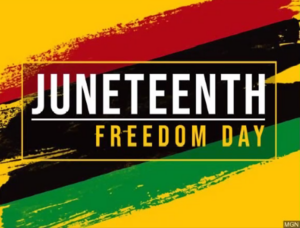 Let’s Learn Juneteenth
Let’s Learn JuneteenthDr. Jessie Fields and Dr. Raquell Holmes
Saturday March 23, 3:00 pm – 4:30 pm, Eastern U.S. Time,
12:00 pm – 1:30 pm, Pacific U.S. Time
In 2021 Juneteenth (June 19th) became an official holiday in the United States celebrating the emancipation of African Americans from slavery. For generations before that it has been celebrated in Black communities. It was born in Galveston Bay, Texas on June 19, 1865. The Confederacy and plantation owners had moved their enslaved people to continue slavery. It took nearly 2 years for approximately 2,000 Union troops to arrive and enforce emancipation. The celebration of emancipation, Juneteenth, then spread over the country.
In 2022, Dr. Raquell Holmes initiated the national and international Freedom
Festival (https://freedomfestivalusa.org), stretching from Juneteenth to U.S. Independence on the 4th of July, celebrating and exploring the connections between freedom and independence. This year, in the run-up to the festival, Dr. Holmes and her fellow activist Dr. Jessie Fields, will lead a conversation with organizers of grassroots Juneteenth celebrations across the U.S. to share what their celebrations are like, how long they’ve been held, why it’s important to them, and how this celebration informs their community and conversations of freedom. This is a chance to learn a lot about U.S. history and culture and to explore the universal implications of Juneteenth.
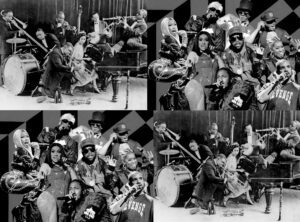 Discord and Harmony:
Discord and Harmony:Allen Cox and Dan Belmont
Saturday, April 13, 12:00 pm – 2:00 pm., Eastern U.S. Time;
9:00 am – 10:30 am Pacific U.S. Time
This will be a look at—and a listen to—the role of African American music has played in embodying and inspiring the ongoing struggle for freedom and full equality in the U.S.A. The session will be a mix of music video clips (Billie Holiday, Nina Simone and Stevie Wonder, among others) and informal conversation led by progressive musician and composer Dan Belmont and life-long grassroots organizer and leader Allen Cox.
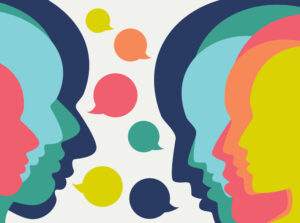
Dr. Jessie Fields, Dr. Hugh Polk and Rachel Mickenberg
Saturday, April 27, 1:00 pm – 2:30 pm, Eastern U.S. Time;
10:00 am – 11:30 am Pacific U.S. Time;
6:00 pm – 7:30 pm, Lagos Time;
7:00 pm – 8:30 pm, Cape Town Time.
In most of our societies so called-mental illness is either a taboo subject or something that specialists—doctors and therapists—are supposed to help us with (if we can afford to pay them). What if, instead, we got together in groups to talk about our emotionality and collectively create our mental health? That’s just the activity that psychiatrist Hugh Polk, medical doctor and community organizer Jessie Fields, and social therapist Rachel Mickenberg have been leading for years, both online and in person at community centers, churches, senior centers and food pantries. Don’t miss this opportunity to participate in the creation of an international conversation in which we share our emotions and pain not to analyze or diagnosis them, but to support each other to grow and develop.
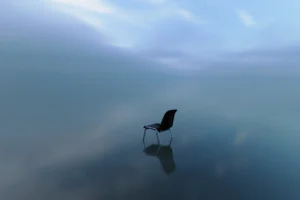 Why We Are All So Lonely—And What We Can Do About It
Why We Are All So Lonely—And What We Can Do About It Carrie Sackett and Murray Dabby
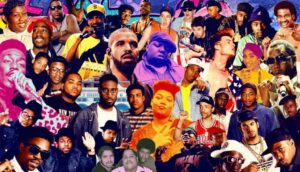 The Revolutionary History of Hip Hop
The Revolutionary History of Hip HopDesire Wandan
Saturday, May 11, 2:00 pm -3:30 pm, Eastern U.S. Time;
11:00 am – 12:30 pm, Pacific U.S. Time
Hip Hop culture emerged from the poor working-class communities of color in the Bronx and Brooklyn and spread around the world as a culture of the disenfranchised. Join Desire Wandan, the East Side Institute’s Media and Tech Producer, host of its podcast “All Power to the Developing,” and nationally acclaimed hip hop dancer as he looks at the revolutionary impulse of hip hop—both a cry of outrage and a celebration of life—which continues to draw inspiration and innovation from oppressed peoples and communities around the world.

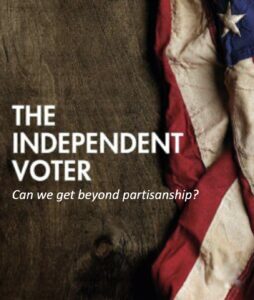 Lloyd International Honors College Annual Lecture & Conversation, 2023
Lloyd International Honors College Annual Lecture & Conversation, 2023
Dr. Thom Reilly, Jacqueline Salit, Dr. Omar Ali
Tuesday, September 12
6:00-7:30 pm, Eastern U.S. Time
HONORS COLLOQUIA STUDENTS come to the event at the EUC Auditorium
Independent voters—the 40–50 percent of Americans who reject identification with either of the two major parties or with any party—are increasing in number and impact. Independents (or non-aligned voters) are determining the outcome of major elections and upending some of the long-held categories around how electoral politics is discussed and organized. This presentation and conversation is led by the authors of the recently published study, The Independent Voter. In their book they argue that independents are a potential engine for a transformation of US democracy.
Join Dr. Thom Reilly, professor in the School of Public Affairs and Co-director of the Center for an Independent and Sustainable Democracy at Arizona State University. Jacqueline Salit, president of Independent Voting and Co-director of the Center for an Independent and Sustainable Democracy at Arizona State University, and Dr. Omar H. Ali is Dean of Lloyd International Honors College and professor of African-American political history at the University of North Carolina Greensboro, as they share some of the history and current ways in which independents have served as catalyst for democracy and political reform. There will be time for questions and comments.
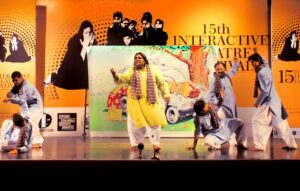
Mohamed Waseem
Saturday, September 23
6:30 pm, Pakistan Standard Time
9:30 am, Eastern U.S. Time
A conversation between Mohammed Waseem, founder and director of the Interactive Resource Center based in Lahore, Pakistan and Dr. Dan Friedman, artistic director emeritus in New York City. In 2000, Waseem, already a veteran of political street theatre, began traveling from village to village in the Pakistani countryside organizing local people, mostly peasants, into theatre troupes—250 of them over the next ten years. “I start with non-actors,” says Waseem. “Never did I audition anyone. … I believe that If you are human, you can perform. Whatever the forms, the knowledge and the skills the community has, we work with that.” His work has subsequently expanded into citizen journalism, video, and television. This is a rare opportunity to learn directly from a global pioneer of performance activism.
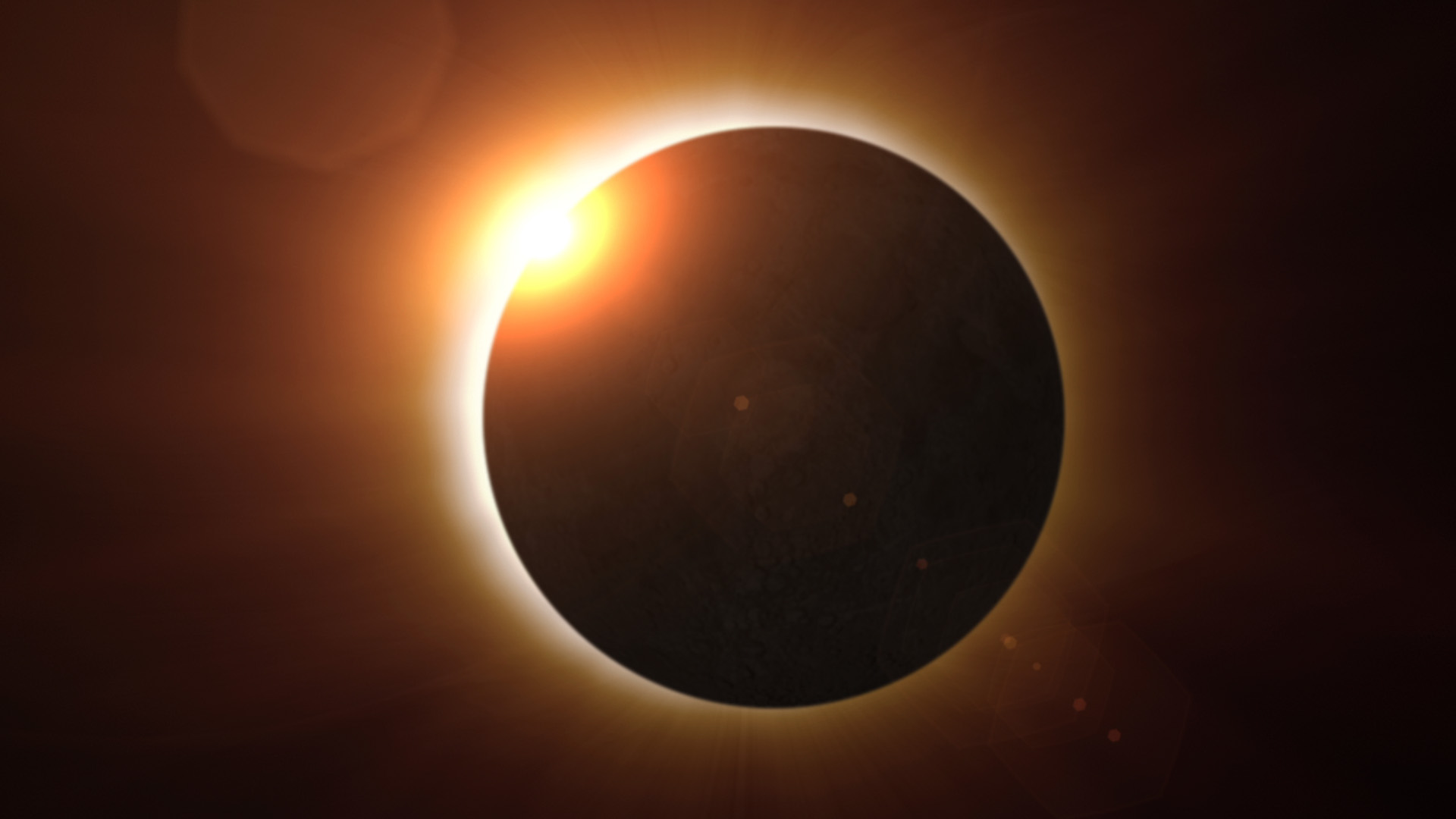 There Goes the Sun…
There Goes the Sun…Dr. Nicholas Gross
Saturday, October 7, 2:00 pm Eastern U.S. Time
Ever want to see a Solar Eclipse? In the next year, there will be an opportunity to view two Solar Eclipses in U.S., Mexico, Central America and parts of South America. The first will be this Fall on Saturday, October 14th, 2023, and the second in the Spring, on April 8th, 2024. This class Dr. Nick Gross, a physicist at Boston University, will review what happens during a solar and lunar eclipse, why eclipses only happen at particular times, and how you can view the eclipse safely.
 Fun with Philosophy
Fun with PhilosophyChris Helm
Saturday, October 14, 2:00 pm, Eastern U.S. Time
Philosophizing is too important to leave to the official philosophers! It should be part of all our lives. Remember when you were a child and constantly asked questions? Never stop. And never accept “It’s just the way things are,” as an answer to anything! Join Chris Helm, a member of the East Side Institute’s faculty and a long-time leader of its Developmental Philosophy Group, in creating a playful philosophical conversation. This workshop provides experience in how to question everything—and why that’s important to living a full life.
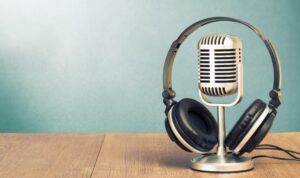 How to Start Your Own Podcast
How to Start Your Own PodcastDesire Wandan
Saturday, October 21, 2:00 pm, Eastern U.S. Time
The Internet has opened new possibilities for “ordinary people” to share their ideas, reach out to others around the world and create new forums for conversation and learning. One of the most accessible of these new tools is the podcast. Podcasting has grown significantly in recent years. Currently there are 464.7 million podcast listeners globally. This number is predicted to reach 504.9 million by 2024. Whether technically experienced or not, you can learn to produce and distribute your own shows on any subject and explore whatever viewpoints you choose.
In this session, Desire Wandan, the East Side Institute’s Media and Tech Producer, and host of its podcast “All Power to the Developing,” will cover the basics of podcast production and answer your question about how to get started.
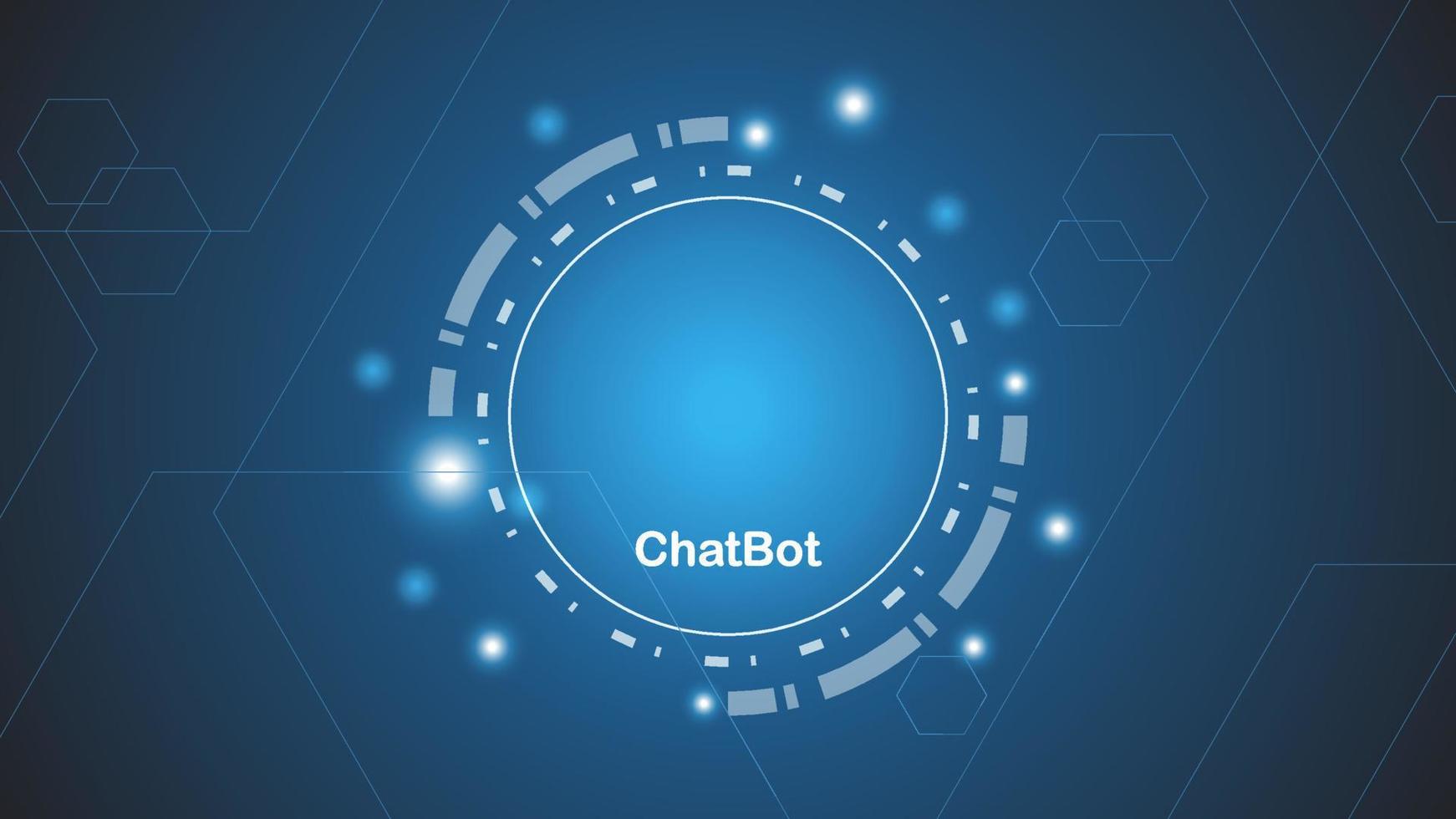 AI, Chat GPT, Bard … Oh My!
AI, Chat GPT, Bard … Oh My!Karen Werner and Nick Gross
Saturday, October 28, 10:30 am, Eastern U.S. Time
These days everyone’s talking about AI (Artificial Intelligence)—its potential and its danger. This collaborative learning experience, led by Karen Werner and Dr. Nick Gross, aims to demystify AI, making it accessible and relatable to everyone, regardless of prior knowledge or experience. You will be introduced to AI’s history, recent developments, and current tools and applications. Through a mix of conversation and interactive activities, we will explore the fundamental principles of AI, promoting curiosity and critical thinking along the way.
 Discord and Harmony: The Struggle for Freedom in the USA Through Blues, Jazz, Soul and Hip-Hop
Discord and Harmony: The Struggle for Freedom in the USA Through Blues, Jazz, Soul and Hip-HopAllen Cox and Dan Belmont
Saturday, November 4, 11:00 am, Eastern U.S. Time
This will be a look at—and a listen to—the role of African American music has played in embodying and inspiring the ongoing struggle for freedom and full equality in the U.S.A. The session will be a mix of music video clips (Billie Holiday, Nina Simone and Stevie Wonder, among others) and informal conversation led by progressive musician and composer Dan Belmont and life-long grassroots organizer and leader Allen Cox.
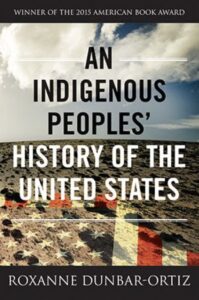 An Indigenous People’s History of the United States: A Conversation with author Roxanne Dunbar-Ortiz
An Indigenous People’s History of the United States: A Conversation with author Roxanne Dunbar-OrtizSaturday, November 18
11:00 a.m. – 12:30 p.m., Pacific U.S. Time
2:00 pm – 3:30 p.m., Eastern U.S. Time
With “Thanksgiving” a week away, this is a good time to separate the realities from the myths of the first encounters between European colonial settlers and the native peoples who inhabited and nurtured North America before 1492. Roxanne Dunbar-Ortiz, author of An Indigenous Peoples’ History of the United States (recipient of the American Book Award 2015), will discuss this and much more with Dr. Omar Ali, dean of Lloyd International Honors College, University of North Carolina, Greensboro and Dr. Dan Friedman, program manager of Let’s Learn! There will be plenty of time for questions and comments from those attending.



Jennifer Bullock

Sunday, February 12
12:00 pm – 1:30 pm Eastern U.S. Time;
6:00 pm – 7:30 pm Lagos Nigeria Time
Join social therapist Jennifer Bullock for an interactive presentation of the unique emotional support sessions offered as part of the Global Play Brigade movement. She will share the origins and practices of the Brigade’s emotional support sessions which sprung from young people in Nigeria and around the world requesting mental health support in the face of fighting against injustices and police brutality. The program quickly expanded to anyone of any age around the world wanting to experiment with creative ways to develop our emotional and social wellness with all of life’s struggles and experiences.
Maria Teresa Continanza

Saturday, February 18
6:00 pm – 7:30 pm, Palestinian Time;
1:00 pm – 2:30 pm, Argentina Time;
11:00 am – 12:30 pm, Eastern U.S. Time
Among the creative possibilities opened up by the pandemic lockdown have been new ways of using Zoom to create theatre across national borders and cultural divides. Theatre artist and English teacher Maria Teresa Continanza, working the British-based Hands Up Project, has brought together, on Zoom, elementary school children from her native Argentina with students from Gaza in Palestine to create and perform new theatre pieces. In this participatory workshop she will teach some of the remote theatre techniques they used, share a short play the children created, and have class participants improvise and perform a play your own.
Dr. Nick Gross, Allison McCarthy, Eric Powell, and Emma Lovett
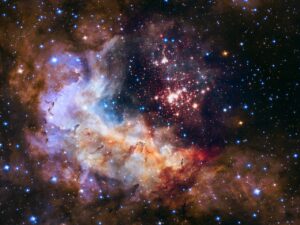
Saturday, February 25, 11:00 am – 12:30 pm, Eastern U.S. Time
Have you ever looked up at the night sky and wondered about the planets, the stars, the galaxies and the vastness of the universe? Join Dr. Nicholas Gross, senior research scientist at Boston University, as he leads a discussion with graduate researchers from the Astronomy Department of Boston University who work with observatories, spacecraft, and computer models. Their research includes work on Brown Dwarfs (substellar objects that are not massive enough to sustain nuclear fusion of ordinary hydrogen into helium), the Heliosphere (the giant magnetic field that envelops our solar system), and the atmosphere of Europa (one of Jupiter’s moons). They will share their backgrounds, what drew them to the stars, talk about the work they do and respond to your questions.
Dr. Dan Friedman
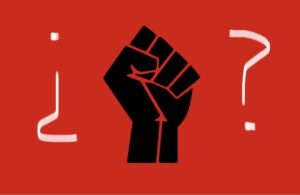
Saturday, March 11, 11:00 am – 12:30 pm Eastern U.S. Time
People all over the world become activists because they want to change things. To change things you need power. Yet the meaning of power is not clear. Think of the slogans we’ve grown up with: “Fight the Power,” “Power to the People,” “Power Corrupts.” Taken together they don’t make sense. If power corrupts, why would we want to give to the people? Do we want to corrupt them? Dan Friedman, program manager of Let’s Learn!, East Side Institute faculty member, lifelong progressive activist and author of the upcoming booklet, “What Is Power?,” invites you to this open-ended conversation about the nature of power, its relationship to authority and the various ways it being exercised around the world.
Gwen Lowenheim
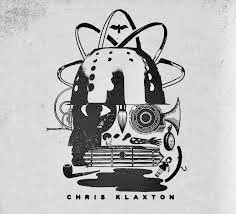
Saturday, March 18, 11:00 am -12:30 pm Eastern U.S. Time
Thanks to hip-hop, remixing—the art of combining or editing existing materials to create something new—has become a celebrated part of international popular culture. Although the term “remix” is new, the activity isn’t. Remixing has always been the key to innovation—artistic, scientific, and social/political. It is what creativity is all about—and it’s something we can all learn to get better at. This class, led by Gwen Lowenheim, an English professor at Pace University in New York City and a lifelong community organizer, will support you to develop your ability to remix with everything around you: your life experience, our 5,000 years of recorded history, the latest digital tools, etc. The class will play with a variety of remixing activities that we can put to use in all aspects of our lives—from developing new job skills to building creative partnerships, from writing poetry to approaching academic work.
Dr. Nadja Cech
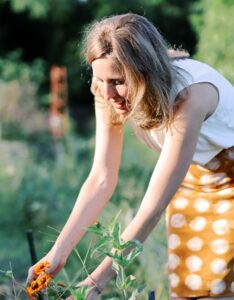
Saturday, March 25, 12:00 pm – 1:15 pm Eastern U.S. Time
Nadja Cech grew up off grid in the Oregon Wilderness. She spent much of her childhood in the company of plants, drawing them, cultivating them in the garden, and making medicine from them. Those early experiences inspired in her a fascination with the relationship between plants and humans, a relationship that she eventually sought to understand more deeply by pursuing a PhD in chemistry. Today, Dr. Cech is Patricia A. Sullivan Professor of Chemistry at the University of North Carolina Greensboro. She works with an extraordinary group of students and scientists from around the globe to discover plant molecules that can be used to treat infectious diseases . In this class, she will share some historical examples of how plants have been turned into some of today’s most effective medicines. She will also tell the story of her own research on the medicinal plant echinacea, a story that illustrates the beautifully complex interactions between plants and the humans who cultivate and consume them. Participants are welcome to come with questions or with their own stories to share.
Dr. Nick Gross and Simeon Bittman
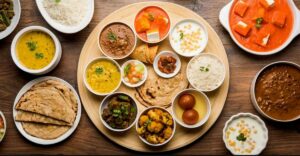
Saturday, April 1, 11:00 am – 12:30 pm Eastern U.S. Time
Ever wonder why adding lemon juice or salt not only adds flavors to food, but also can have significant effects on the texture structure of the food? Why is kneading dough is important to the texture of bread, or how flour acts as a thickener? Dr. Nicholas Gross of Boston University will be joined by chef Simeon Bittman to answer these questions and explore the science behind the chef’s favorite traditional dishes.
Ron Short and Ben Fink, Roadside Theatre
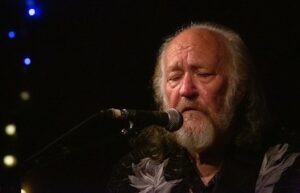
Tuesday, April 11, 7:00 pm – 8:30 pm
We all have stories to tell, many passed along to us by our parents, grandparents or the uncle who lives up the road or around the corner. These stories can provide us with identity, continuity and a sense of history. They help shape how we see ourselves and the world. They are one of the foundations of our culture(s). Join master storyteller, playwright, composer, musician and performer Ron Short as he tells stories drawn from his Appalachian heritage and helps you find ways to tell yours. Short has been a member of Kentucky’s Roadside Theater since 1979 and his stories have been the basis of many of the theatre’s plays. He will be joined by Ben Fink, a Roadside ensemble member, the founding organizer of the Letcher County Culture Hub and the Performing Our Future coalition. For more about Roadside Theatre’s newly published book of its plays, go to https://www.artinademocracy.org/about

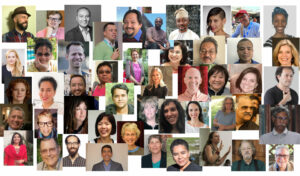 El Liderazgo a Través del ‘Activismo Performativo’
El Liderazgo a Través del ‘Activismo Performativo’(Leadership Through Performance Activism)
Jorge Burciaga-Montoya, Miguel Cortes, Sandra Paola Lopez-Ramirez
Sabado/Saturday, Septiembre/September 10
5:00 pm – 6:30 pm Hora del este EE.UU./ Eastern U.S. Time
3:00 pm – 4:30 pm Ciudad Juarez-El Paso Time
¿Ha oído hablar del ‘Activismo Performativo,’ el nuevo enfoque lúdico y performativo para abordar cuestiones sociales, culturales y políticas? ¿Le gustaría conocer a estos activistas y aprender sobre lo que hacen y cómo repercute en sus comunidades? Entonces ven a esta primera clase de ¡Aprendamos! en español, en la que tendrás la oportunidad de dialogar con algunos de los que están experimentando con esta nueva forma de activismo en diferentes regiones hispanohablantes del mundo. Compartirán cómo han creado espacios performativos fuera de las limitaciones institucionales del teatro donde pueden surgir la creatividad, el desarrollo personal y grupal y la transformación social. Quién sabe, quizá usted también quiere llevar el activismo performativo a tu comunidad.
Have you heard about Performance Activism, the new playful, performative approach to engaging social, cultural and political issues? Would you like to meet such activists and learn about what they do and how it impacts on their communities? Then come to this first ever Let’s Learn! class in Spanish where you will have the opportunity to dialogue with some of those experimenting with this new form of activism in different Spanish-speaking regions of the world. They will share how they have created performative spaces outside of the institutional constraints of the theatre where creativity, personal and group development and social transformation can emerge. Who knows, maybe you’ll want to bring performance activism to your community as well!
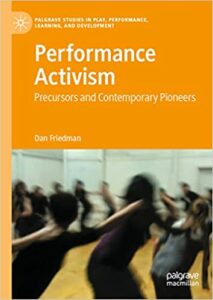 Performance Activism: A Reconstructive Approach to Social Activism and Generating Possibility
Performance Activism: A Reconstructive Approach to Social Activism and Generating PossibilityDr. Dan Friedman
Monday, September 12, 6:00 pm -7:30 pm, Eastern U.S. Time
Dan Friedman, the Artistic Director Emeritus of the Castillo Theatre in New York City, has long been active in progressive political and community-based theatre. He will introduce us to a new way of exercising power that is emerging around the world: Performance Activism. Not over determined by what it’s against, Performance Activism is a reconstructive approach to changing the world. It allows us, through play and performance, to generate new ways of seeing, build new kinds of relationships, and imagine new social and political possibilities. Over the last three decades, performance activists have brought play and performance into classrooms, workplaces, community centers, hospitals, prisons, and onto the streets. Dr. Friedman will unpack how and why Performance Activism has emerged—and why it’s important in a world facing so many crises. There will be ample time for questions and conversation.
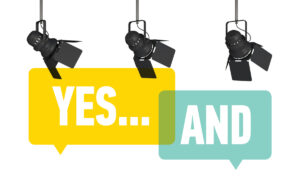 Monday Play!
Monday Play!Ethan Divon & Dr. Omar Ali
Monday, September 19
12:15-1:00 pm Eastern U.S. Time/2:15 am-3:00 am Port Moresby, Papua New Guinea Time
Ok, so if you want to get better at playing basketball, what do you do? Play basketball! If you want to get better at having conversations, or become a better learner, improve your grades, get a new job, win the lottery, go to the moon, or fly like an eagle into the future … come to Monday Play! That’s right, we invite you to join one of our weekly open improv sessions co-led by Ethan Divon and Omar Ali of Lloyd International Honors College at the University of North Carolina at Greensboro. Come practice ‘yes, anding’ with others—that is, build on what others say or do, and create new possibilities together. Zero humor and/or related skills required, just a willingness to play.
 Science In Your Kitchen
Science In Your KitchenPurvi Sanghvi & Dr. Nick Gross
Saturday, September 24
11:00 am – 12:30 pm Eastern U.S. Time/8:30 pm – 10:00 pm Mumbai Time
A physicist and an historian walk into a kitchen. The historian also happens to be a wonderful cook. The physicist is an innovative grassroots educator. What do you have? This class. Join Purvi Sanghvi, a graduate student in history at Georgia State University, and Nicholas Gross, senior research scientist at Boston University, for a cooking class … with a twist. Sanghvi will share her traditional family recipes from India, while Gross will discuss the science behind why these recipes work the way they do and what the benefits of the ingredients and cooking process are. It promises to be an informative and delicious class.
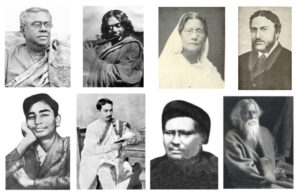 The Great Bangla Poets
The Great Bangla PoetsQazi Abdur Rahman
Saturday, October 1
10:00 am – 11:30 am Eastern U.S. Time/8:00 pm – 9:30 pm Dhaka Time
Longtime educator Qazi Abdur Rahman of the Oxford International School in Dhaka, Bangladesh, leads us on a discovery of some of the greatest Bangla poets of all time. He will open the class with a brief introduction to Bangla literature, going back to its origins 1,500 years ago and tracing it to its modernist flowering in the 20th Century. The life and impact of five Bangla poets will be introduced and a poem from each will be performed in the original Bangla by Rahman’s students from Oxford and in English translation by Let’s Learn! class participants. The readings will be followed by reflection and discussion.
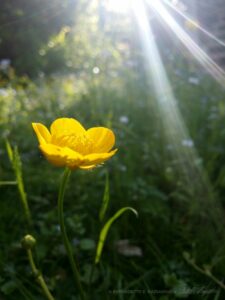 (Re-Imagining) Education: How Do We Go About It?
(Re-Imagining) Education: How Do We Go About It?Dr. Jaime E. Martinez
Thursday, October 20th, 1:00 pm-2:30 pm Eastern U.S. Time
Let’s Learn! is all about bringing together people from all walks of life all over the world to share and create knowledge and culture together. Just how can we do that? This is a chance for students, teachers, and life-long learners of all sorts to get together and play with new possibilities for teaching and learning. Join Dr. Jaime E. Martinez, associate professor of Interdisciplinary Studies Sciences at the New York Institute of Technology, in this participatory workshop, inspired by teams working to explore educational needs and finding new ways of engaging them. No experience with formal education needed—just curiosity and a willingness to explore the unknown with others.
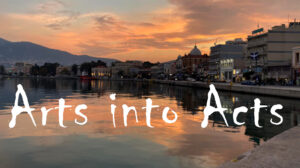 Arts Into Acts
Arts Into Acts
Elena Boukouvala
Saturday, October 22
11:00 am – 12:30 pm Eastern U.S. Time/4:00 pm – 5:30 pm London Time/6:00 pm – 7:30 pm Lesbos Time
The Greek island of Lesbos lies just 12 kilometers (7 miles) off the coast of Turkey. Since 2015, millions of refugees and asylum seekers, fleeing war, violence and political persecution have passed through the island seeking a better life. Thousands of people have lived in the Moria Refugee Camp, which Doctors Without Borders has called “the worst refugee camp in the world.” Initially many locals welcomed the refugees. However, in the years since, the political climate has grown divisive. Anti-migrant nationalism has grown and incidents of racism have become an everyday reality. At the same time, Mytilene, the capital city of Lesbos, has become a melting pot of cultures, languages, lives, and dreams. There young people have found ways to connect and create art and community. Through their art they responded to alienation, creating collective power and giving expression to a collective voice. Their arts became acts of solidarity and hope. During this session young people will share their arts and their acts, their journeys, and what inspired and maintained them. The session itself will become an act of support for their dreams. We will interweave conversation and performance, inviting the participants of the class to join us to co-create a world stage for their acts. The session will be hosted by Elena Boukouvala, dramatherapist, performance activist and action researcher who has worked and played in the camps and communities of Lesbos (and beyond) since 2016. The session is inspired by the action research project “Arts into Acts.”
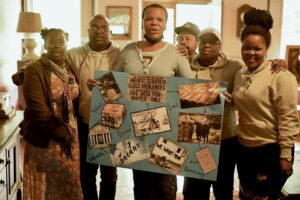 Resistance & Imagination: The Role of the Arts, Creativity and Play in Activism
Resistance & Imagination: The Role of the Arts, Creativity and Play in ActivismAlex Sutherland
Saturday, October 29
1:00 pm – 2:30 pm Eastern U.S. Time/7:00 pm – 8:30 pm South African Time
In this participatory workshop, Alex Sutherland, the Coordinator of Creativity in Activist Education and acting Head of Programs at the Tshisimani Center for Activist Education in Cape Town, South Africa, will lead an exploration of the ways in which creativity and imagination are key to political and social activism. We will look at case studies from around the world that have used play, humor and creativity to re-imagine another world while voicing resistance to the status quo. There will be a special focus on Africa where liberation struggles have consciously embraced arts and culture in organizing and campaigning. Workshop participants will engage in simple activities that can build an artistic activist repertoire of resistance and imagination.
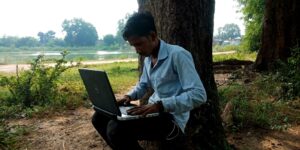 Laptops in the Village
Laptops in the VillageDr. Syed Mizanur Rahman
Friday, November 4
9:00 am – 10:00 am, Eastern U.S. Time/7:00 pm – 8:00 pm, Dhaka Time
Daffodil International University in Dhaka, Bangladesh has a policy of “One Student, One Laptop.” Each student is provided with a laptop so they can fully participate in 21st Century education and connect with the wider world. When the pandemic lockdown struck in 2020 and students needed to return to their home villages, they were asked by the university to take their laptops with them and to use them to generate curiosity and learning back home. In this conversation led by Dr. Syed Mizabur Rahman, director of the General Education Department at Daffodil, a group of returning students share their experiences and how it impacted on them and on their communities.
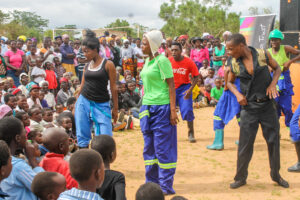 Political Theatre in Zimbabwe
Political Theatre in ZimbabweDaniel Maposa & Dan Friedman
Tuesday, November 15
10:00 am – 11:00 am, Eastern U.S. Time/4:00 pm – 5:00 pm, Zimbabwe Time
Zimbabwe has a history of creative and combative political theatre stretching back to its War of Liberation in the 1970s. Daniel Maposa is the founder and leader of the Savanna Trust, one Zimbabwe’s most impactful political theatres. He has led its evolution from “hit and run” street theatre under the Mugabe dictatorship to the participatory performance workshops it generates today in villages all over the country. These workshops organize local residents to create their own interactive plays about issues of importance to them. Join Maposa in conversation with Dan Friedman, author of Performance Activism and Artistic Director Emeritus of New York’s Castillo Theatre, for a conversation about Zimbabwe’s political theatre—past, present and future.

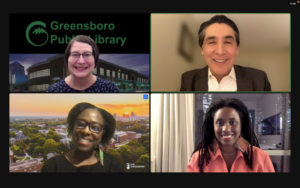 Afro-Latin America: History, Culture, and Politics
Afro-Latin America: History, Culture, and PoliticsMonica Carrillo & Nodia Mena
Thursday, February 17, 7:00pm – 8:30 p.m.
REGISTER HERE:
https://us06web.zoom.us/webinar/register/WN_Iy-zURqSQamVT6x7kKTlPg
This sweeping presentation and conversation on the history, culture, and politics of Afro-Latin America will be given by Monica Carrillo, human rights leader, poet, and Grammy Award-winning Afro-Peruvian artist, and Nodia Mena, Garifuna (African and Indian-descended) cultural ambassador from Honduras, dancer, and educator based in North Carolina. Q&A with Carrillo and Mena will follow moderated by Omar Ali, historian of the global African Diaspora and Dean of Lloyd Honors College, University of North Carolina, Greensboro. The event is co-sponsored with the Greensboro Public Library and the African American & African Diaspora Studies Program at UNC Greensboro.
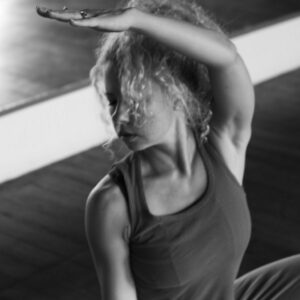 Movement and Emotional Balance
Movement and Emotional BalanceValerie Green
Saturday, February 26, 1:00 pm – 2:30 pm
REGISTER HERE:
https://uncg.zoom.us/meeting/register/tJUpcumgpzotGdyc6ADO76O_m5yPKuYiSV56
Join professional dancer and choreographer Valerie Green, artistic director of Dance Entropy, in this unique workshop which explores the complex and subtle relations between movement and emotionality. Words label what we know; movement can reveal the unknown. Starting with expressive movement exercises, Green will lead students on their own personal movement journey within a safe and nurturing environment. This workshop aims to find a physical expression to the feelings, whereby a healing process can begin. No previous dance experience needed. Wear clothing you can move in.
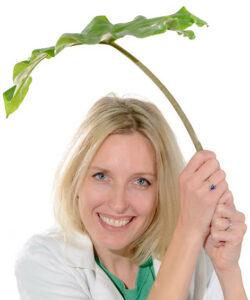 The Joy and Wonder of Not-Knowing: Science, Arts and Humanities
The Joy and Wonder of Not-Knowing: Science, Arts and HumanitiesNadja Cech & Omar Ali
Tuesday, March 1, 11:00 am – 12:15 pm
REGISTER HERE:
https://uncg.zoom.us/meeting/register/tJYofumuqTgiG9GlqyykeIE2YWFUDGyyN2Tv
When you think of science do you think of complex formulas or memorizing charts and tables or do you feel curiosity and the excitement of discovery? For Dr. Nadja Cech, Patricia A. Sullivan Distinguished Professor of Chemistry at the University of North Carolina at Greensboro, it’s the latter. Join her in conversation with historian Omar Ali, Dean of Lloyd International Honors College, to explore the joy and wonder to be found in the ongoing quest of discovering how the universe works by asking big and small questions, and drawing from all disciplines and approaches. The conversation is part of a class they regularly co-teach entitled “How do we know what we know?: Power, Epistemology, and Methodology.” The conversation is being co-sponsored by Cultivating Ensembles, which brings together individuals with different sensibilities and interests in science, technology, engineering, mathematics, and medicine (STEMM) to celebrate the interwoven nature of sciences, technologies, humanities, and arts as human activities.
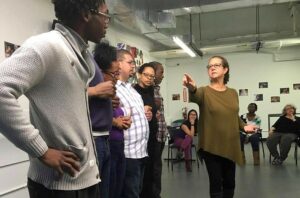 Improv for Everyone
Improv for EveryoneMarian Rich
Monday, March 7, 10:30 am – 11:45 am
REGISTER HERE:
https://uncg.zoom.us/meeting/register/tJwpf-6qrD8jHNKnBZGqL06SW55c2XT0hjWU
“The heart of improvisation is transformation.” – Viola Spolin
Improvisation, the ability to actively listen, accept “offers” from fellow performers, and create something new together, is a vital life skill. Learn the basics of improv—group warm ups and “yes, and” scenes—from Marian Rich, a talented teacher, improvisational performer and co-founder of the Global Play Brigade. Since this is Improv for everyone, no experience necessary!
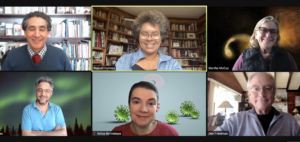 Ask a Scientist
Ask a ScientistRaquell Holmes, Nick Gross, Martha McCoy & team
Saturday, March 12, 1:00 pm – 2:30 pm
REGISTER HERE:
https://uncg.zoom.us/meeting/register/tJAldOyvrDoqE9SMCo1KuLoRCuVJxTeepgH8
When you ask a scientist a question, you may get an answer, but you may also get a question back. Have you ever wondered why the weather changes on Earth—or Mars? What makes water healthy, or not? How do vaccines work? What are “black holes”? Bring your questions to this conversation with scientists in physics, medicine, biology, mathematics, and computing. Discover how different scientists respond. Do scientists all think alike? How do they develop their ideas? We’ll create answers together with the essential tools of science: drawing, curiosity, and building with the contributions of others. Let’s develop our relationships to science and to one another.
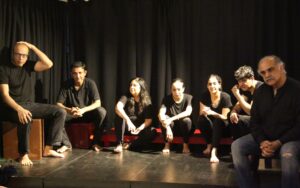 Indian Political Theatre
Indian Political TheatreSanjay Kumar & Dan Friedman
Sunday, March 20, 9:30 am – 11:00 am
REGISTER HERE: https://uncg.zoom.us/meeting/register/tJMof-CtrzwsHNDkgJF1UJHR6dEsHvgf8nD7
India has a rich and varied theatre history stretching back two thousand years. It also has one of the most wide-spread and deeply-embraced progressive political theatre movements in the world. Sanjay Kumar, who teaches theatre and literature at Hans Raj College of Delhi University and is founder and leader of the pandees, one of India’s most impactful political theatres, lives and breathes this history. Join him in conversation with Dan Friedman, author of Performance Activism and Artistic Director (Emeritus) of New York’s Castillo Theatre, for a conversation about India’s political theatre—past, present and future.
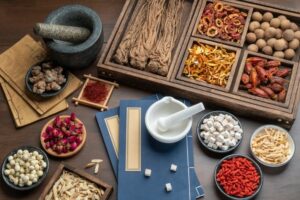 Chinese Medicine
Chinese MedicineDr. Wen Der Jan & Mei Hui Zhang
Friday, April 1, 9:00 pm – 10:30 pm.
REGISTER HERE:
https://uncg.zoom.us/meeting/register/tJ0sdeqvrDwsGdTYBohvQdrTOGeTK-3D0VNO
Chinese medicine approaches health and illness from a different perspective than medicine in the West—and has much to offer a world that is seeking healing and wellness. Join Dr. Wen Der Jan and Mei Hui Zhang of the Ludi Community School in Taipei, Taiwan, for this introduction to the basic assumptions and methods of Chinese Internal Medicine. The class will be conducted in Chinese (Mandarin) with simultaneous English translation.
 What Is Populism?
What Is Populism?Sunday, April 10, 2:00 pm – 3:15 pm
Omar Ali & Dan Friedman
REGISTER HERE: https://uncg.zoom.us/meeting/register/tJEqfuyspjMuHNaCiZX3nZgHOjslAalH_h9A
All over the world today—in the United States, Brazil, France, Hungry, the Philippines—anti-democratic, authoritarian and neo-fascist movements are being called “Populist” by the media and political pundits. Yet Populism started in the late 19th Century in the U.S. as a movement of poor farmers and workers to oppose the authority of the big corporations and their political parties. It was a movement for more democracy, not less. What has happened since and why this confusion? Dr. Omar Ali, Dean of Lloyd International Honors College, and author of the pioneering study, In the Lion’s Mouth: Black Populism in the New South: 1886-1900, in conversation with Dr. Dan Friedman of the East Side Institute, will discuss the history and significance of Populism and how and why its name is being misused today.

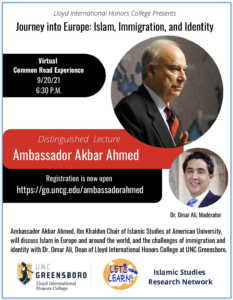 Journey into Europe: Islam, Immigration, and Identity
Journey into Europe: Islam, Immigration, and IdentityAmbassador Akbar Ahmed
Monday, September 20 – 6:30 pm–7:30 pm (US Eastern Standard Time)
Ambassador Akbar Ahmed, Ibn Khaldun Chair of Islamic Studies at American University, will discuss Islam in Europe and around the world, and the challenges of immigration and identity with Dr. Omar Ali, Dean of Lloyd International Honors College at UNC Greensboro. One session.
WATCH RECORDED EVENT BY CLICKING HERE
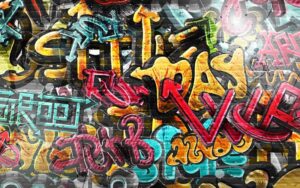 The History & Politics of Street Art Around the World
The History & Politics of Street Art Around the WorldSue Davies
Sundays, September 26 and October 3 – 12:00 pm–1:30 pm (US Eastern Standard Time)
REGISTER HERE:
https://uncg.zoom.us/meeting/register/tJIsdeuuqTgjHdCzkzVJd-UL8-aj5dibksO6
Over the past decades, street art has evolved from an illegal and persecuted street activity by youth, mainly young men, to a celebrated art form around the world. This class will explore the history and politics of street art. We will be viewing all forms of street art, including graffiti, murals, stenciling, wheat pasting, tagging, and bombing. We will explore the question of what is art and who gets to answer that question. The class will include videos of street artists speaking about their work. Topics for discussion will include: street art as a tool for democratizing art, graffiti vs. street art, the commodification of street art, the relationship between street art and gentrification, women and LGBTQ+ street artist, street art as a tool for community development and other topics. Students will be encouraged to go out street art hunting and to bring photos of street art to the second class. Two sessions.
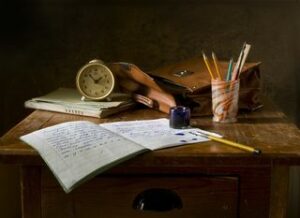 Memoir Writing
Memoir WritingHenry Ferris & Susan Massad, M.D.
Wednesdays, September 29 and October 6 – 2:00 pm–3:30 pm (US Eastern Standard Time)
REGISTER HERE:
https://uncg.zoom.us/meeting/register/tJEucuuupj4qG9YGnGk6909koEb1gOIFqyQm
Writing your own story is exhilarating, thrilling, nerve-wracking and cathartic. Emotions run high and the drama is real. In this two-part class, you will discover the skills needed to unfold a narrative, realize characters, compose dialogue and find the words that tell the story inside you in a compelling way. Veteran book editor Henry Ferris and veteran writing teacher Susan Massad will provide you with tips and pointers to help you focus on the right tale, the themes you want to explore, and proven methods for making it all come alive on the page. You will write during class and receive guidance on how to improve and keep going forward with your writing. Join us and bring your story out to the world! Two sessions. Enrollment limited to 30 students.
 Improv for Everyone
Improv for EveryoneMarian Rich
Monday, October 18 – 10:30 am–11:45 am (US Eastern Standard Time)
REGISTER HERE:
https://uncg.zoom.us/meeting/register/tJYucOiorDsjHtfmT777hZL6HtnqQsRMq2FU
“The heart of improvisation is transformation.” – Viola Spolin
Improvisation, the ability to actively listen, accept “offers” from fellow performers, and create something new together, is a vital life skill. Learn the basics of improv—group warm ups and “yes, and” scenes—from Marian Rich, a talented teacher, improvisational performer and co-founder of the Global Play Brigade. Since this is Improv for everyone, no experience necessary! One session.
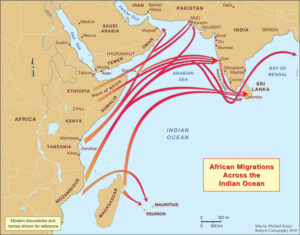 Africans in India: Siddis in the Global African Diaspora
Africans in India: Siddis in the Global African DiasporaJazmin Graves, Ph.D.
Tuesday, October 19 – 6:00 pm–7:15 pm (US Eastern Standard Time)
REGISTER HERE:
https://uncg.zoom.us/meeting/register/tJwkdO-ppjgvEt1KRcQdojdHOl3fufdUDkwl
Dr. Jazmin Graves, Assistant Professor of African American and African Diaspora Studies (AADS), who recently completed her Ph.D. at the University of Chicago will discuss her research on the communities of African-descended people in India with Dr. Omar Ali as part of this AADS Conversation with the Community/Let’s Learn! initiative. One session.
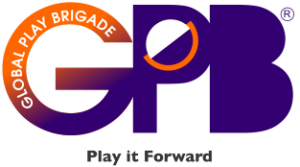 Play, Community, and the Global Play Brigade
Play, Community, and the Global Play BrigadeCathy Salit
Thursday, October 21 – 12:00 pm–1:00 pm (US Eastern Standard Time)
REGISTER HERE
https://uncg.zoom.us/meeting/register/tJEqc-6srzksGNbT4DW6pvSYt-7fN42oFp4P
An accomplished stage performer and co-founder of Global Play Brigade: Play it Forward. Change our World, Cathy Salit will discuss her work using play and performance to help build a global community of ‘players’ during the pandemic … and beyond! The session will include practical (playful) tips on performing that can help everyone be more creative and connect with others. One session.
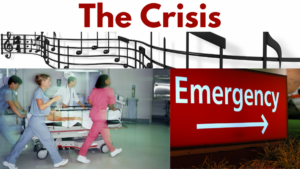 An opera composed by Aaron Siegel, libretto by Susan Massad
An opera composed by Aaron Siegel, libretto by Susan MassadFriday, October 22 – 6:30-7:15 pm (US Eastern Standard Time)
“The Crisis” is an opera based on an unfortunate and all-too-common experience in a NYC emergency room.
REGISTER HERE:
Singers: Sishel Claverie, Tomas Cruz, Gabriel Hernandez, Joshua Jeremiah, Emily Suuberg
Piano: Dima Glivinskiy
Creating the opera changed everything. Come hear this beautiful musical piece and join us in the conversation that follows.
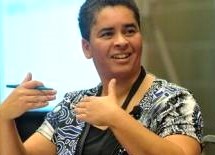 Ask a Scientist
Ask a ScientistRaquell Holmes, Ph.D. and Colleagues
Saturdays, October 30 and November 6 – 1:00 pm–2:30 pm (US Eastern Standard Time)
REGISTER HERE:
https://uncg.zoom.us/meeting/register/tJMscOytpjwrGNLS-w1XnbRF1Uk8UJAS3tDw
Have you ever wondered about why the weather changes on Earth—or Mars? What makes water healthy, or not? How do vaccines work? What are “black holes”? Do scientists all think alike, or do they have disagreements? Bring your questions to this two-part conversation with a physicist, chemist, biologist, mathematician and computer scientist. We’ll create and answer questions together in ways that challenge our relationships to science and to one another. Two sessions.
